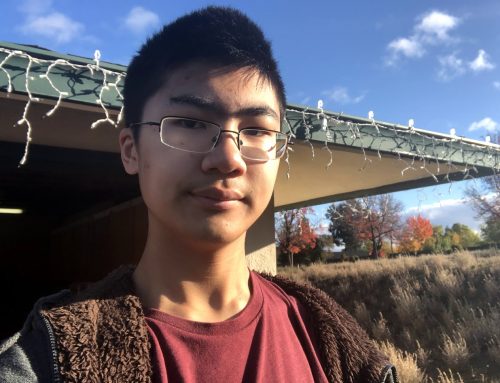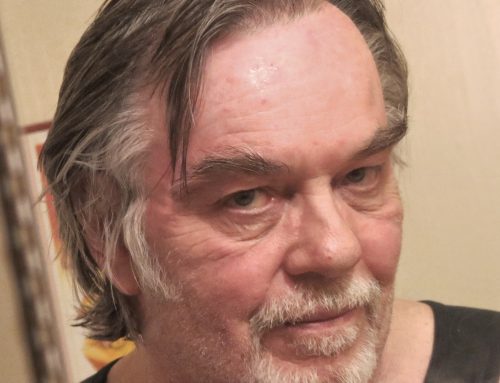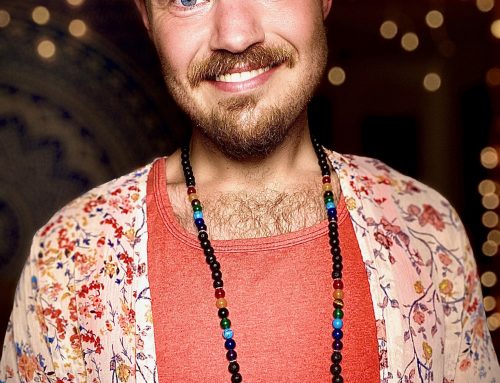#WorldSuicidePreventionDay reminded him that it’s only the choice of the individual that truly matters.
“I know, too, that death is the only god who comes when you call.”
(Roger Zelazny, Frost & Fire)
Since a young age I’ve thought about death, dying, or suicide almost every day—through adolescence when I had my depressive and “serious consideration of self-terminus” bouts, into adulthood where anxiety and despair claimed my quieter hours, and into my 30s where the drudgery and angst of life are just daily coats I hang up because I’ve been alive enough to know about better days, true joy, and the long life of adventure waiting for us.
But let’s be real about the lifers who experience depression and suicidal thoughts for years on end, past those awful teenage years when impulsive actions claim many, and into life after marriage, kids, career, and any post-college enlightenment.
You see, I have a full, wonderful life, but it has always been there, like a grey friend waiting with me, patiently, sometimes giving me strength in those “just let go” moments, when I’m reminded that there is no center to the universe, that failure is okay, and that life always goes on—and feeling this certain way actually saves me a little.
Life goes on—always. With or without you. It’s this bleak point of view that is refreshing, that I get to live another day because I’ve decided to live another day, and that whatever life will throw at me, I’ve already been down so long I can’t help but remind our friend—the it—that I’ve already considered it all, and I’m okay with living.
Because life with me alive is better for everyone, even though some of us know that at the lowest points of depression and suicidal thinking erase those guilty, blessed feelings.
It’s sort of a life-long “ready to die” feeling rather than a “want to die” emotion that we should all be talking about.
And on World Suicide Prevention Day, it was wonderful to see all of these encouraging memes and statements on Facebook and Twitter, but I know that they won’t all work.
And they shouldn’t work, because they can’t always work (and they don’t). Some things—a day of awareness, a friend’s consolation, an intervention—just can’t work long-term for those with persistent, chronic, major, or manic depression, or for those who live with PTSD, grief, ennui, melancholy, or just good old fashion existential angst.
It’s always there, inside your chest, lying to others, and waiting its turn.
It’s just like that.

But that doesn’t mean there isn’t hope for those who are currently or frequently suicidal, or that encouragement won’t work on those who are in the throes of an episode that will lead to suicide.
I just know that for me, it wouldn’t have worked during previous dark times when suicide was on my mind like anything else—variations of the how to, scenarios that seemed inevitable, and periods of deep longing for an end even though everything seemed normal, healthy, and ordinary.
But, for those who have dealt with depression and suicidal thoughts since they were young, there is a secret niche that we don’t talk about, burrowed in the years of wood and stone: it doesn’t always get better—it just gets quieter.
Most of the time.
 Let’s be real about suicidal feelings
Let’s be real about suicidal feelings
I’m not going to describe in detail my own suicide attempts or share with you the times when I helped and reached out to those who were depressed and/or suicidal, nor am I going to share the stories of those who I’ve known who are no longer with us.
But I will share the inverse of my saving grace from back in the day when it seemed inevitable that I would kill myself, which is:
Just wait until tomorrow
Like a neatly crocheted wall hanging, I convinced myself that “Kill Yourself Tomorrow” would be my daily affirmation until I didn’t need it anymore.
If life felt so awful, I told myself, then let life be a slow death.
And eventually, I stopped being suicidal and learned to live with those feelings, which changed into a livable melancholy that I wear and that changes as I get older.
Almost twenty years ago there weren’t any anti-suicide campaigns, days, or messages the way we have it today, and to be honest, if there had been one, I would have—like many depressive and suicidal people—ignored it because, depending on the level of depression, no one but me could pull me out.
And I pulled myself out.
That is, over time—a long time, that is—I pulled myself out, with the help of close friends, from my late teens on through and toward adulthood.
 Let’s be real about this—is it okay for men to want to die, even for a spell?
Let’s be real about this—is it okay for men to want to die, even for a spell?
No amount of semi-colon tattoos on wrists, “it gets better” messages, or encouraging proverbs would have worked.
Religion, friends and family intervention, literature, romantic relationships, and distractions didn’t subside the feelings or make them go away.
And as I get older I realize that some of us just get stuck with these feelings of dread and melancholy, and you have to find a way to live with it.
And when someone does take his life, it kind of makes sense in the worst, most obvious way.
Eventually—in the arc of my mature life—I became too old for suicide—even though that’s a silly assumption—but as a father I wouldn’t want to miss out on a life with my children and wife, or a chance to grow old, or a chance to slow life so that maybeit would finally leave without any trace.
At a younger age, I knew it all—or I thought I did: I was valuable to people around me and of course they would be affected if I had taken my life—but it wasn’t about them. It was about me. Plus, when you’re dead, you don’t feel guilt for dying. But you do leave a mess of trauma, pain, hate, guilt, and depression for those who never were depressed in the first place.
“Do something”? There’s nothing you can do. For some cases. There really isn’t. We smile on #preventionday and then it’s back to a life-long conversation with our friend.
Some would call this cynical, but I think I’m being realistic.
Maybe this is why such a big killer of men gets such little notice, because we don’t want it to be there, undoing men, highlighting what is perceived as weakness when it’s not cowardice at all.
And men on the whole won’t address it possibly because—government intervention or otherwise—of the fear of weakness in men, or the hesitation that if we give it a name, we’ll have to confront this totally normal I want to die attitude in society.
Imagine a war on feeling shitty.
In the end
Although I had close, sympathetic friends who were there for me during many dark times, and some who were compassionate (and those who had no idea or those who did and didn’t know what to do), in the end, it was me alone forcing myself to get over it and stay alive for the next season of life. Then a season more. Then a season more. I decided to give myself life rather than take it.
Some facts:
- Nearly 30,000 Americans commit suicide every year—800,000 worldwide.
- In the U.S., suicide rates are highest during the spring.
- Suicide is the 3rd leading cause of death for 15 to 24-year-olds and 2nd for 24 to 35-year-olds.
- On average, 1 person commits suicide every 16.2 minutes.
- Each suicide intimately affects at least 6 other people.
- About 2/3 of people who complete suicide are depressed at the time of their deaths. Depression that is untreated, undiagnosed, or ineffectively treated is the number 1 cause of suicide.
- There is 1 suicide for every 25 attempted suicides.
- Males make up 79% of all suicides, while women are more prone to having suicidal thoughts.
- 1 in 65,000 children ages 10 to 14 commit suicide each year.
- There are 2 times as many deaths due to suicide than HIV/AIDS.
- Over 50% of all suicides are completed with a firearm.
So—I want to live, and live deep.
I want to grieve.
I want to endure those feelings of suffering (or not), and experience every moment of my life, whether it be full of dread, anxiety, or other.
It is a wonderful life, that is, all the wonderful parts of it.
And you and I have the power to stay alive, for one day more, and then another—and then another—to meet us on the other side of several decades from its start.
I’ll see you there.
This post is part of a joint series by The Good Men Project and Stigma Fighters in sharing stories of real men living with mental illness. To submit your story, see below.
—

Stigma Fighters is an organization that is dedicated to raising awareness for the millions of people who are seemingly “regular” or “normal” but who are actually hiding the big secret: that they are living with mental illness and fighting hard to survive.
The more people who share their stories, the more light is shone on these invisible illnesses, and the more the stigma of living with mental illness is reduced.
For Stigma Fighters’ Founder Sarah Fader’s recent profile in The Washington Postthat discusses how more and more people are “coming out” with their mental illness, see here.

The Good Men Project is the only international conversation about the changing roles of men in the 21stcentury.
Mental health and the reducing the social stigma of talking about mental health is and has been a crucial area of focus for The Good Men Project.
As Dr. Andrew Solomon stated during his interview with us, people writing about their own experiences mitigates each of our aloneness in a profound way: “One of the primary struggles in all the worlds I have written about is the sense each of us has that his or her experience is isolating. A society in which that isolation is curtailed is really a better society.”
We are partnering together on this Call For Submissions, because our missions overlap and because we want to extend this conversation further.
♦◊♦
If you are a man living with mental illness, and want to share your story, we would love to help.
To submit to the Good Men Project, please submit here.
To submit to Stigma Fighters, please submit here.
Submissions will run in both publications. When you submit, please make sure to let us know you submitting as part of this Joint Call for Submissions with Stigma Fighters and Good Men Project.
♦◊♦
Any Questions?
Feel free to contact us:
mkasdan@gmail.com (Good Men Project)
sarahfader@gmail.com (Stigma Fighters)
allieburkebooks@gmail.com (Stigma Fighters)







Leave A Comment